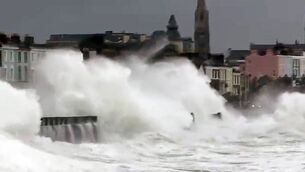Ireland is 'guardian of ocean giants', Cork conference told

The Fair Seas inaugural conference at Cork City Hall will hear how three quarters of Irish people believe the Government should prioritise fully protecting valuable marine ecosystems. On the Celtic Mist are Rohan Fleury, Alissa Fleury and Eamon Whitty speaking with Sibéal Regan, education and outreach officer with the Irish Whale and Dolphin Group. Picture: Clare Keogh
Ireland is the "guardian of ocean giants" and should be viewed as a "large ocean state", various experts have told the inaugural Fair Seas World Ocean Day conference in Cork.
National Geographic’s explorer in residence Sylvia Earle, who was the first ever female chief scientist at the National Oceanic and Atmospheric Administration in the US, as well as being a member of the worldwide Ocean Elders conservation group, told the conference in Cork City Hall it is a "crucial time for Ireland" as it prepares legislation to safeguard marine protected areas (MPAs).
CLIMATE & SUSTAINABILITY HUB












